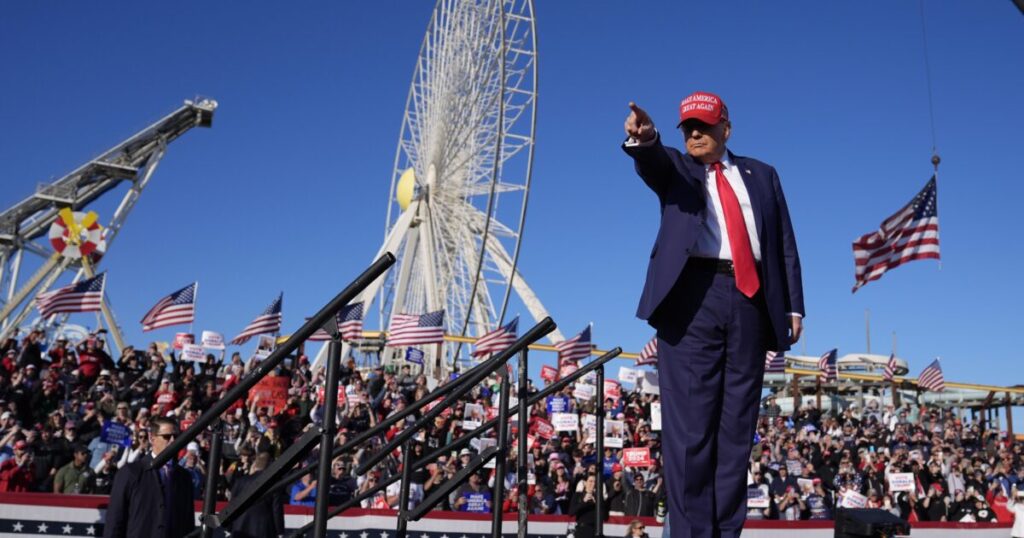In late October, a pivotal gathering of about 200 grassroots activists unfolded at Renzo’s pizzeria in Marlboro, New Jersey, centering around a live broadcast of “Wise Guys,” a program on Newsmax. This event marked an electrifying moment for the America First Republicans of New Jersey (AFRNJ) under the leadership of Mike Crispi, a bold and charismatic figure in local politics. The participants were filled with optimism as they anticipated the upcoming Election Day, driven by a notable upsurge in early voting for Donald Trump, which positioned New Jersey—historically a Democratic stronghold—onto the national radar for the first time in decades. The gathering served as a dynamic rallying point for like-minded individuals committed to Donald Trump’s agenda, hinting at the state’s potential for a significant political transformation.
Crispi, alongside a panel that included notable figures from the conservative media landscape, detailed the extensive outreach efforts of the AFRNJ aimed at maximizing voter turnout for Trump. The organization had meticulously organized 28 events throughout New Jersey in just one year and utilized a vigorous grassroots approach to rally support. With a coalition of over 1,000 volunteers, the AFRNJ aimed to foster engagement and mobilize low-propensity voters—those typically disinclined to support Republicans—by advocating for Trump’s policies. The campaign reached a peak of momentum following Trump’s record rally in Wildwood, which in turn elevated Crispi’s profile and solidified his position as a vital player in the state’s Republican framework.
The grassroots movement spearheaded by Crispi represents a swing towards a more aggressive Republican presence in a state typically viewed as a lost cause for the GOP. Historically, New Jersey hasn’t voted for a Republican president since 1988, and Trump faced significant defeat margins in previous elections. However, recent political trends signified a potential shift; the close gubernatorial race in 2021 demonstrated that enthusiasm for Republican candidates could be recapturing the state. Crispi’s assertion that New Jersey isn’t as blue as commonly perceived gained traction as more local voters began aligning themselves with the Trump ideology, signaling an unusual appeal that could transform the political landscape of the state.
Amidst a backdrop of historical Democratic dominance, the emergence of Crispi and the AFRNJ suggests a possible revival of Republican influence inspired by Trump’s candidacy. While traditional Republicans often depended on established party structures and donor circles, Crispi’s grassroots strategy positions him at the forefront of a revolt against the longstanding political elite, including figures like Chris Christie. Critics of the old guard have accused them of being out of touch with the evolving demographics and sentiments of New Jersey voters. Crispi’s sentiment captures a burgeoning demand for leadership resonating with the MAGA philosophy, which identifies the key issues of national relevance such as immigration and economic policies that have not resonated with the populace in past elections.
The backlash directed toward Crispi from the established political class illustrates a deeper rift within the New Jersey Republican Party, sparking tension between MAGA supporters and traditional party figures. Crispi and his affiliates face a barrage of criticism from mainstream media, often utilizing sensationalist tactics to undermine their momentum. Despite these challenges, the grassroots movement continues to flourish, demonstrating resilience and connecting meaningfully with constituents across the spectrum. This was underscored by intensified early voting numbers, which, as reported by high-profile supporters like Elon Musk, signified a potential Republican lead in a state typically reflective of Democratic dominance. Such developments underscore a shift in voter affiliation steered by grassroots organizations like the AFRNJ.
The confluence of demographic changes and the evolving political landscape has framed New Jersey as a potential battleground ripe for Republican revitalization. Former Democrats, particularly among working-class communities and increasingly diverse electorates, are expressing disillusionment with traditional party policies, creating an opportunity for Crispi’s movement to capitalize on these sentiments. The AFRNJ’s focus on this demographic aligns with Trump’s messaging, reaching out to voters who once identified with Democratic ideals but now find themselves alienated from their party’s current direction. Crispi’s project, titled “Project 14,” exemplifies this targeted approach, aiming to register individuals within networks who historically do not participate in Republican voting.
Ultimately, the current strength and momentum of the AFRNJ could indicate a lasting transformation within New Jersey’s political fabric despite the entrenched resistance from established figures. Crispi’s and the movement’s commitment to authenticity and direct engagement has begun to cultivate a new political generation ready to challenge the status quo. This grassroots enthusiasm echoed the nationwide trend as similar movements sprouted across various states, suggesting the rise of a new approach to Republican politics that resonates well beyond traditional membership. As Crispi and the AFRNJ continue to gain traction, they epitomize the larger narrative of a redefined Republican Party that could very well be on the brink of reclaiming its footing in a state it has long been distanced from.

